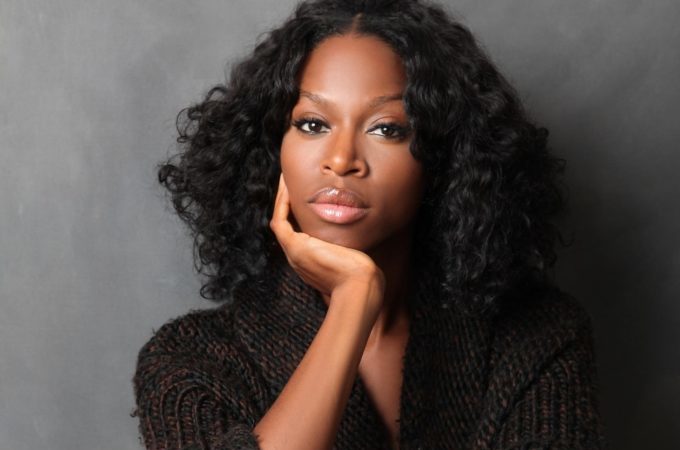
Taiye Selasi embodies and lives an immense freedom. This is partially because she feels at ease with multiple vocations, languages, places and people but also because she doesn’t quarrel with contradictions but straddles them with ease. She debuted on the literary scene in 2005 with her evocative and controversial essay about “Afropolitans,” a new generation of emigrants who trace a connection to the African continent. This essay spurred vigorous debates. The term became a theory, an identity, a brand, but, more importantly, Afropolitan has forever entered general usage.
Selasi’s novel Ghana Must Go followed eight years later, but her essay had prophetically pierced through many of the pernicious identity and microaggression debates that were soon to come out in the open. Selasi had already made that unbearable question “where are you from?” irrelevant with her ideas of multi-locality. With her bold embrace of beauty and fashion, she had also done away with parameters that insist that intellectuals, feminists, writers should somehow disengage from what is perceived by some as frivolities.
When I met Taiye Selasi on zoom (how else these days?) I found her, predictably, very beautiful despite the inevitable frozen frames and wifi irritations. What I had not predicted was how rapidly she speaks and how she suddenly flips the scripts and puts you in the spotlight. She moved between witty and serious, prickly and generous, frank and tactful; a wily subject who deconstructs the questions before answering the question, and then deconstructs her own answers, all at lightning speed. We covered a range of topics from Afropolitanism to travel to beauty to languages to migration to digital identities, topics she reflected on with care, depth and enthusiasm.
(The interview has been edited for clarity.)
Bhakti Shringarpure
You do a mind-boggling amount of things! You are a writer and an artist. You are working on a documentary series. You were a judge on a reality TV show about writing talent. You teach as well. What is at the core of these projects or rather, what might bind these different strands together?
Taiye Selasi
It’s interesting. I’ve long observed a tendency to demand of the multi-media artist some kind of singularity — a plotting of the multiple interests along a single intention, if you will. Certainly at the start of my career I made that demand of myself. How would I account for my multiple passions? What excuse could I possibly give? To be honest, though, as the years have passed (and as the passions have blithely proliferated) I’ve started to question my questioners, foremost myself.
The language used for interrogation is often the language of being: You are a this and you are a that; so many things to be! (Tsk, tsk.) But the language that accords with the work itself is the language of love: You love this and you love that; so many things to love! It is not that I am a novelist, a screenwriter, a photographer, and and and. It is that I love novels, I love films, I love photographs, I love ideas. As you may know I have the same difficulty with the language of country. I am a Nigerian, I am a Ghanaian, I am an American, and and and. Fair enough. But far more interesting to me than “I am” is “I live,” “I value,” “I love.”
If there is a core, it is love — and if there is some core love, it is love of story. I have said before that my work is, above all things, a pursuit. A pursuit of truth and beauty; of the intersection between truth and beauty, content and form, and so forth. But even that is just a fancy way of saying that I am in love with story. I fell in love at an early age and never fully recovered. What binds the strands together—to the extent that they need binding, I’m happy for them to flap about wildly—is me. Uncle Walt had it right, no? Do I contradict myself? Very well then I contradict myself. I am large, I contain multitudes. Or better still: Do my passions contradict themselves? Very well then they contradict themselves. My love is large, it contains multitudes.
Bhakti Shringarpure
A radical kind of love! Of course, I am struck also by how multilingual you are. You were doing the reality show in Italian, you now live in Lisbon and there were other places and languages before that. Let me ask you that retro Ngugi wa Thiongo question about reclaiming African languages. What do you feel about this?
Taiye Selasi
I have a very simple if heartfelt response to that retro question: English is an African language. My English is an African language. My English is my own African language. It seems ridiculous that I should have to sort of accept the colonial presence, learn the language, master the language, and then be told on top of it that the language, now mastered, is not mine. It belongs to me. Quite literally, my language belongs to me. The way I use it is wholly my own. I have claimed it and changed it and I’ve made it mine.
Bhakti Shringarpure
So it’s safe to say you are not writing your next novel in Twi and then translating it back into English?
Taiye Selasi
(Laughs) I could do. But I can’t even write in standard English to be honest. I’ve tried. Turns out, I can’t write prose in standard English. I write prose in Taiye-English and then desperately hope that it can be translated, understood.
Bhakti Shringarpure
And which is so beautiful and so musical, and must not change at all.
In the literary and scholarly community, you are associated with that delicious term: Afropolitanism. Today, 15 years later, how has the concept evolved for you? In fact, the Afropolitans we met in the essay “Bye Bye Babar” are different from the Afropolitan characters in your book “Ghana Must Go.” And then later in your interviews, Afropolitanism is not fun and hip and freeing as it was made out to be, it was about “pain.” In 2014, you said, “It was from that stranded place that I wrote the essay.” Can you say more?
Taiye Selasi
When you ask how “the concept” has evolved, I smile: Which concept? Whose? My original project was to dignify with a name a certain mode of human experience. That experience, per force of being a human one, is complex. Exultant, triumphant, melancholic, multi-faceted, messy and more. So often we’re asked to speak of African human experience in absolute terms: Successful or stranded? Celebratory or sorrowful? I refuse. Looking back to 2005, reflecting on that dignifying project, I can state the obvious: The very instinct to dignify arises from some experience of indignity. To be told what you are and are not, what you are not enough of, or not really: This is an indignity.
Whatever melancholy was “later” discovered is there, unmasked, in the original essay — obscured, for some, only by a learned refusal to engage with African multiplicity.
You say to someone: Look, here is a woman, a sort of West-African-blend Afropolitan woman. She is delighted by her identity. She is thoughtful about it. She has experienced a great deal of trauma around its complexity. She is proud. There’s this instinct, I’ve found, to say: But she’s African. She can only be one. Proud and assertive, or pained and alienated? Pick one. It is this oversimplification, or this insistence on simplification, against which I push.
Bhakti Shringarpure
Yeah, I think it’s an attempt to derail or criticize what is seen as a wealthy jet-set quality that people perceive in that essay.
Taiye Selasi
Funny that. The essay describes, very specifically, a group of people in movement. But they are not—or not mostly—in movement toward luxury packaged vacations. They’re going from Storrs to Nairobi to see their family, from London to Lagos on on-sale flights, they’re counting their pennies to pay inflated prices at Christmas, they’re trying to get home (from home).
Bhakti Shringarpure
So true. And, I can relate to that personally.
Taiye Selasi
TS: That immigrant kid who read the article in 2005 (or shortly after) and said, “This is me,” was not for the most part rich. That immigrant kid was sent to some prestigious university, usually on some kind of scholarship, not because of his parents’ abundant wealth but because of their obsession with upward mobility. She was sent off to places of higher learning in pursuit of higher earning. He was told to study hard, to get a good job, to repay his loans (and his relatives’ too), to hustle and not to stop hustling until he’d entered, irrevocably, the global middle class. As he did.
To be clear: This is not an experience of relaxed wealth, as I’ve known it or seen it expressed in the Northeast of the United States or the bucolic countryside surrounding Oxford. That kind of generational wealth is not available to most of the people who identified, and still identify, with the essay. Did I grow up in the “jetset”? Is that what we’d call it? “Globetrotting”? It was more accurately saving hard-earned money to get home to see our aunts. We never called that “holiday.” We never called it “vacation.” Travel was how we kept our family together. We didn’t have a choice.
We did have the means. And that is, undoubtedly, a privilege. But the fracturedness of the family unit, its multi-locality, is a post-colonial outcome. To re-write that multi-locality in capitalist terms is to erase the human cost, the heartbreak.
Bhakti Shringarpure
I think Blackness, Africanness, or African Blackness, is always in an ambivalent relationship with capitalist excess and luxury or things like that. People are critical of Beyonce. People are annoyed by Chimamanda Adiche for her fashion stuff and modeling the makeup line and all that. So it’s a conundrum. Maybe it’s an imperative to counter all the poverty porn and the impoverished representations?
Taiye Selasi
You’re absolutely right. That ambivalent relationship with capital cuts right across blackness, as it is called. But to counter the poverty porn narrative with equally essentializing representations: This is not my project. I’ve no interest in monolithic portrayals of any kind.
I’ve been investigating one mode of human experience because it is interesting and familiar to me. I’ve been delighted to discover that it’s both interesting and familiar to so many others. But, as I’ve written before, it is neither surprising nor alarming that, of the 1.2 billion humans on the continent and 140 million in the diaspora, there are those who do not find familiar the notion of Afropolitan experience. This is as it should be.
Bhakti Shringarpure
In your TED talk, you have the 3R’s exercise (Rituals, Relationships, Restrictions) to determine individual multi-localities. In this talk, you also reference facetime and facebook and internet things like that. I was wondering about the important of digitality to migrant identity today.
One way we can think about is how writing migration and diaspora borrows from digital forms. The writing may be intrinsically imitating online styles, i.e fragmented, hyper-textual, chat-dialogue, bloggy, exploring networked/social media identities, and such like. Your book is a good example too with the clipped sentences and its, sort of, musicality. Not to mention, our past two decades are so shaped by our crazy relationship with the Internet and social media, that I feel the two might have become interlinked.
Taiye Selasi
Fascinating. It is certainly the case that, had Instagram existed in 2005, I wouldn’t have written “Bye Bye Babar.” I quite simply wouldn’t have needed to. My reflections on Afropolitan experience, or the perceived urgency of those reflections, arose from a kind of visual isolation. I had access to no visual representation of that experience beyond my immediate reality, and so had to conjure with words a community that today would form via images.
The essay is a fossil, a contemplation located in a pre-Instagram world. The people it touched could not regularly, globally, see each others’ faces. It would be silly to write about an Afropolitan experience in 2020; anything I might wish to describe is plainly visible to everyone I wish to engage. And I mean everyone: From New York to Nairobi, Jo’burg to Kreuzberg, Luanda to London. Everyone has access to the image bank, the visual identity project.
When you speak of the digital in relationship to the migrant experience, I think of the ways in which my personal geography has become more knowable. More see-able. Technology has changed the way I understand myself as multilocal, not least by granting me one-to-one access to millions of people who see themselves as multilocal too. Our sense of community, our sense of being stranded from a community, changes when we can see not one but multiple communities every day. All day. Then, technology alters content certainly. But I wonder, does it alter form?
Bhakti Shringarpure
Well, it might be a sort of chicken and egg thing….
Taiye Selasi
Right? The way that the migrant mind, if you will, approaches the world might already be fragmentary. Digital offers perhaps a way to express that fragmentation, to play with it, reject it, and so forth. I don’t know that I have access to any more linear a way of processing narrative than what you see, for better or worse, when you encounter me on the page.
Bhakti Shringarpure
I find that women engage more with Afropolitanism. It is also marketed more to women and some of the ways in which the term has become a brand is proof of this. Can you comment on this relationship?
Taiye Selasi
Women are told, relentlessly, what they are meant to be: good daughters, good students, good wives, good mothers, good Christians, good Muslims, good girls. [ Insert Auntie chorus here. ] I don’t mean to suggest that African men don’t face societal pressures of their own. But the way in which a society entitles itself to comment upon, applaud, legitimize and delegitimize identity is, undoubtedly, gendered. Surely we can expect those members of a society whose selfhood is most policed to engage most passionately in projects of self-definition? In any language that breathes a bit of air into the identity project, any contemplation that serves to relax the boundaries around being?
Bhakti Shringarpure
Your relationship to Beauty, capital B. We put so much value on women writers and their beauty, sometimes we criticize them for it. I’m thinking of your incredible pictures in magazines. I’m thinking of Adichie’s images. We all gush over Zadie Smith and Jhumpa Lahiri, we fetishize Arundhati Nose’s nose-ring and we have a desperation to “see” Elena Ferrante….you know what I mean?
Taiye Selasi
I have a beautiful mother, which no doubt affected my early relationship with Beauty. Juliette Tuakli is an extraordinarily gorgeous woman, considered beautiful in every room she enters, and she knows it. As a student of my mother’s beauty, I learned interesting things about beauty itself: It is a kind of intelligence, an energy, a peculiar form of power. Still now, every story I tell includes some character(s) described as beautiful; it’s an energy with which, creatively, I love to play. These days, though, other energies interest me more. My mother’s beauty is, very specifically, rooted in a feminine beauty ideal; if I read you well, you reference the same with your allusions to Adichie, Lahiri, Roy, Smith (beautiful women all, capital B). But the Feminine power (capital F) that interests me most has nothing to do with ideals. Headwraps, nose rings, high heels, big hair: It’s all a form of play. The real action takes place offscreen, in the realm of the unseen. That’s where my story with Beauty has, only just recently, begun.
Bhakti Shringarpure
That’s such a great answer. As part of my “research” I went through your Instagram. And I was amazed not just at the gorgeous images but also your openness, perhaps boldness is the word…you are very comfortable being photographed there and in the gorgeous magazine spreads I have seen of you. And I don’t know if you’re actually comfortable but this is what you are projecting and it is inspiring in the capital F sense .
Taiye Selasi
Thank you for looking through the Instagram feed. For me it’s another form of conversation. I’m sort of obsessively attracted to beautiful things, to beauty in the world, to beautiful landscapes, a beautiful cloud, beautiful light posts. And why not, I’ve come to think. I move through the world. I’ve got two eyes that work fairly well when I’ve got my glasses on (laughs). Why not enjoy all the visual sumptuousness that the world has to offer, to play with it, to find a place of delight and respite within it? As a photographer, then, I’ve made my peace with beauty.
As a woman, what can you do? A beautiful woman, a beautiful face, beautiful features, whatever one calls it—surely it’s just another experience that the world has to offer? For the beholder it can be pure joy. For the “beheld” a pain in the ass. But if it’s going to be a pain in the ass, shouldn’t we laugh at least? It’s meaningless in the end, all that appears to be, appearance. Why not have a bit of fun with it is what I think.
You’re incredibly beautiful, Bhakti. I’d love to hear your thoughts.
Bhakti Shringarpure
Oh gosh…(laughing)
Taiye Selasi
TS: I admit that I didn’t know what you looked like. These days, when I hear from people I don’t know, I make an effort not to google them, not to see their faces. I love encountering people’s words, their minds, before their faces. If you wouldn’t mind me asking, I wonder what your relationship with beauty is.
Bhakti Shringarpure
It’s anxious. And as someone who works so much on race and feminism and postcoloniality, the racial aspect gets very foregrounded. I also know that Indians, South Asians, maybe all Asians are the more openly fetishized women of color. So there’s a lot of anxiety there. And I also have a beautiful mother, and am half-kidding, but it’s a pain in the neck.
Taiye Selasi
And how. So much of brown womanhood—so much of brown woman beauty-hood—is held to be for others. It can be a challenge, I think, for the brown woman to say—and an even greater challenge for her to believe—”All of this is for me.” All of this beauty is for me. It exists to delight me. This beautiful flower, this beautiful sunset, this beautiful river, this beautiful world: I am the intended recipient. I am not just a beautiful thing in it to make other people delighted. I am the beholder. Reclaiming my identity as a “beholder” from my obligation to be “beheld” was a big part of my photography practice. What you might recognize as a kind of playfulness began and still resides there: In my engagement as an empowered observer. A playful beholder.
Bhakti Shringarpure
In 2015, you provoked us with a keynote lecture titled “African Literature Does Not Exist.” So here’s a Taiye Selasi inspired assignment for Taiye Selasi: It’s 2020. Define or Defy(ne) “African” Literature.
Taiye Selasi
Any human literature informed, to some meaningful extent, by one (or more) of an infinity of time-space realities described, by the author of said literature, as African (winks).


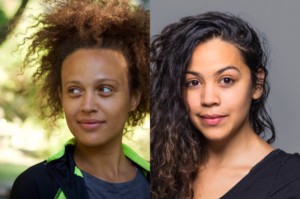
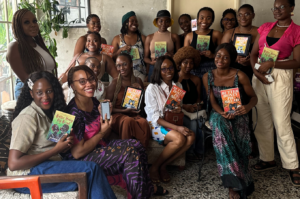
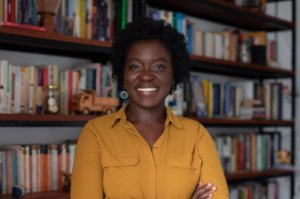
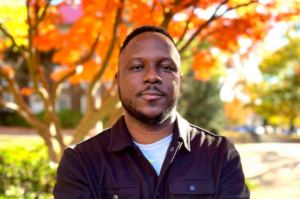

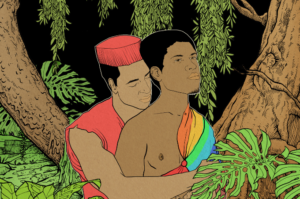

Revising Afropolitanism: An interview with Taiye Selasi – Doublethekor September 15, 2020 05:42
[…] Favourite Writing, How To Write Revisiting Afropolitanism: An Interview with Taiye Selasi […]